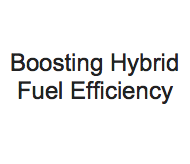Press Release: Toyota Develops New Semiconductors to Boost Hybrid Fuel Efficiency

Toyota Develops New Semiconductors to Boost Hybrid Fuel Efficiency
Toyota City, Japan (May 20, 2014) – Toyota is using one of the hardest materials in nature (after diamonds) to develop a semiconductor chip it hopes will improve the fuel efficiency of its hybrids, such as the Prius, by as much at 10 per cent.
The company and its partners announced today that they have developed a silicon carbide (SiC) power semiconductor for use in automotive power control units (PCUs). Toyota plans to begin test-driving vehicles with the technology on public roads in Japan within a year.
PCUs play an important role in hybrids and other vehicles with an electrified powertrain such as plug-in hybrids and hydrogen fuel cell vehicles: they supply electrical power from the battery to the motor to propel the vehicle, and also send electricity generated during deceleration back to the battery for storage. However, PCUs account for approximately 25 per cent of the total electrical power loss in hybrids, with an estimated 20 per cent of the total loss associated with the power semiconductors alone.
Toyota said the new semiconductor chips would allow it to reduce the size of current automotive PCUs by 80 per cent and that it has already achieved a 5 per cent improvement in fuel efficiency in test vehicles. Toyota aims to commercialize the technology by 2020.
The new chips, along with improved engines and aerodynamics, are key steps the company is taking to continue advancing hybrid powertrains, a technology it pioneered nearly 17 years ago.
For more information on the silicon carbide chips, click here.








































